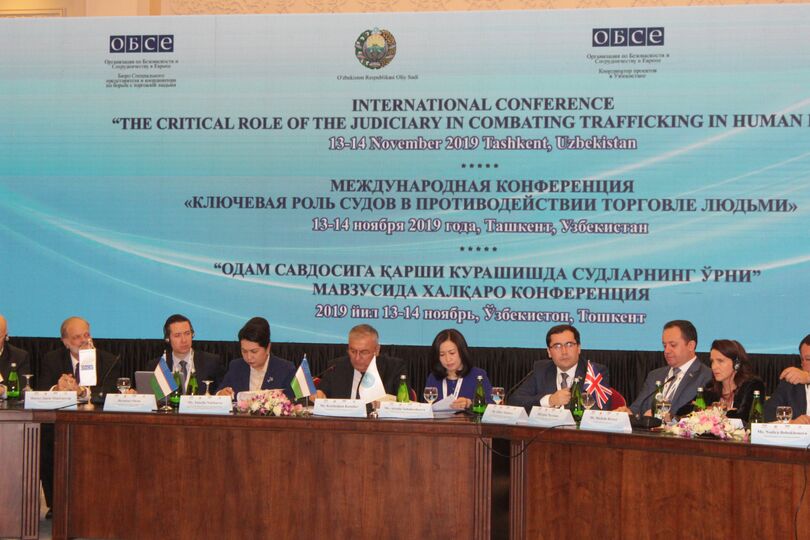On 13-14 November, Tashkent was the venue of the International Conference on "The Key Role of the Judiciary in Combating Trafficking in Human Beings" sponsored by the Supreme Court of the Republic of Uzbekistan and the OSCE's Office of the Special Representative and Co-ordinator for Combating Trafficking in Human Beings.
Speaking at the opening ceremony, Chairperson of the Senate of the Oliy Majlis of the Republic of Uzbekistan Tanzila Narbaeva said that the number of crimes related to trafficking in human beings had dropped by almost 68.8 percent over a period of the past two years.
According to Ms Narbaeva, preventive and explanatory work and efforts to raise the awareness of people were crucial in achieving this result. In addition to this, administrative measures were taken in 2019 against 250 officials. She added that a Programme of Measures to Protect the Rights and Freedoms of Uzbekistan Citizens Abroad had been adopted. Combating trafficking in human beings has been made a state policy. In 2019, President Shavkat Mirziyoyev issued an executive order establishing the National Commission for Combating Trafficking in Human Beings and Forced Labour.
OSCE Special Representative and Co-ordinator for Combating Trafficking in Human Beings Valiant Richey told the conference about the OSCE's work in this field and its preemptive and risk-reduction measures. He stressed that trafficking in human beings eroded human rights and rule of law, as well as law and order and the fight against crime, inequality, discrimination, corruption and migration.
SCO Deputy Secretary-General Aizada Subakozhoyeva read out a message of greetings from SCO Secretary-General Vladimir Norov, which said that trafficking in human beings was a serious problem practically for all countries amid growing globalisation. The UN Global Report on Trafficking in Persons puts the number of victims of this crime at more than 21 million people the world over. About 64 percent of them are subjected to labour exploitation, 19 percent- to sexual exploitation, and the rest — to other forms of slavery. 70 percent of the world's human trafficking victims are young girls and women, and one-third of all victims are children.
The problem is exacerbated by the fact that unlike other widespread transnational crimes, this is a highly secretive type of crime.
The important thing in this connection is to establish international cooperation in combating human trafficking, start a close dialogue and develop common approaches.
The Agreement between the Governments of the SCO Member States on Cooperation in the Fight against Crime enables their law enforcement agencies
to cooperate in preventing, curtailing, identifying and uncovering crimes related to human trafficking, particularly in women and children.
The message also stressed that the Joint Declaration approved by the SCO Bishkek Summit in June 2019 noted the special importance of close coordination in combating transnational organised crime, human trafficking and other types of crime and emphasised the need for the further improvement of legal infrastructure in this field.
The participants exchanged views on a number of topics, such as "Criminal Justice in the Fight against New Trends in Human Trafficking," "The Role of Supreme Courts in Ensuring an Effective Application of Laws in Combating Trafficking in Human Beings," and "Strengthening International Cooperation to Combat Trafficking in Human Beings."
The event was attended by representatives of Kazakhstan, Kyrgyzstan, Russia, Azerbaijan, Armenia, Georgia, Ukraine, Latvia, Spain, Portugal, France, the Netherlands, Serbia, Greece and the UK.
